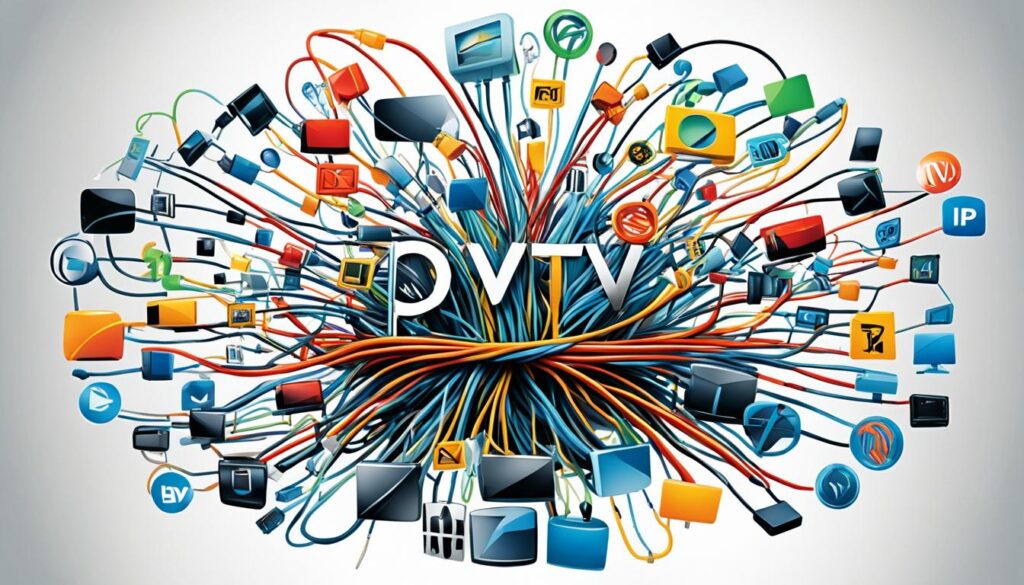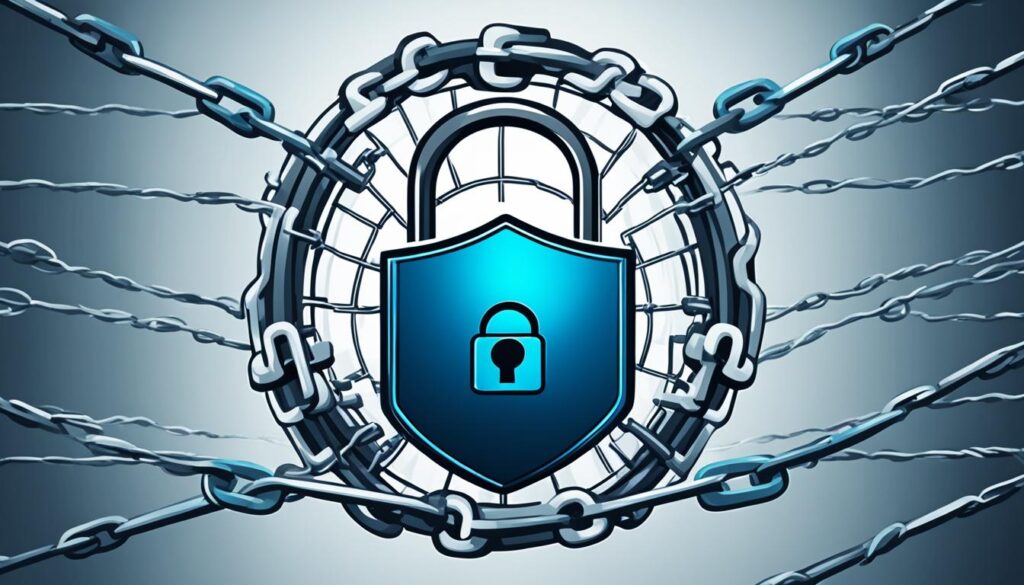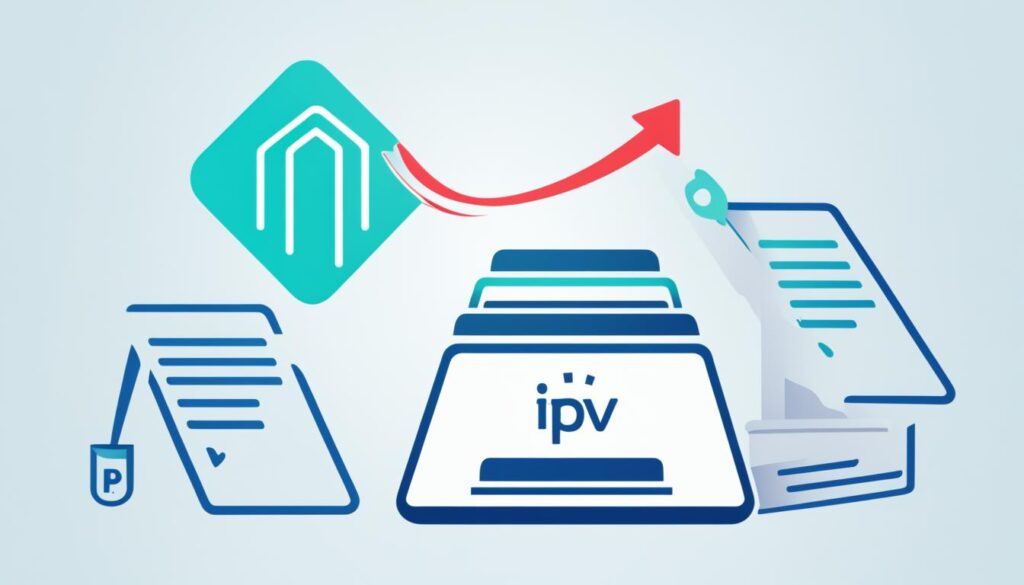Did you know that the global IPTV market is projected to reach a value of $104.25 billion by 2025? This fast-growing industry has revolutionized the way we consume television content, providing an abundance of channels and on-demand services through internet protocol technology. But with this rapid expansion comes a complex legal landscape that requires careful consideration of copyrights, licensing requirements, and regulatory frameworks.
In this article, we will explore the legal considerations surrounding IPTV, understanding the importance of intellectual property rights, licensing agreements, and compliance regulations. Whether you are a service provider, content creator, or consumer, gaining insight into the IPTV legal framework is essential for navigating this dynamic industry.
Key Takeaways:
- The global IPTV market is projected to reach $104.25 billion by 2025.
- IPTV legal issues revolve around copyrights, licensing requirements, and regulatory frameworks.
- Intellectual property rights protect content creators and require proper licensing agreements.
- Compliance with legal regulations and licensing agreements is crucial for IPTV service providers.
- Choosing legitimate IPTV services ensures a legal and reliable streaming experience.
Understanding the Legalities of IPTV
When it comes to IPTV, understanding the legal landscape is crucial to ensure a compliant and enjoyable streaming experience. The legality of IPTV is dependent on various factors, including the content being accessed and the licensing agreements in place. Failure to abide by copyright laws and licensing agreements can lead to copyright infringement and other legal consequences. In this section, we will delve into the key aspects of IPTV legality, including copyright infringement, piracy, and intellectual property rights.
IPTV Legal Landscape
The IPTV legal landscape encompasses the regulations and laws concerning the distribution and consumption of television content through internet protocol television services. The legal framework differs across jurisdictions, making it important for users to understand the laws specific to their region.
IPTV Legality
The legality of IPTV services can vary depending on whether the content being accessed is authorized or unauthorized. While there are legitimate IPTV providers that obtain proper licensing agreements, some services offer access to copyrighted content without authorization. Engaging in the use of unauthorized IPTV services can expose users to legal liabilities, as these services often infringe upon intellectual property rights.
IPTV Copyright Infringement
Copyright infringement refers to the unauthorized use, reproduction, or distribution of copyrighted material. With regards to IPTV, accessing and streaming copyrighted content without proper licensing agreements is a violation of copyright laws. IPTV services that facilitate the distribution of copyrighted material without authorization can face legal action.
IPTV Piracy
IPTV piracy involves the unauthorized reproduction and distribution of copyrighted content through IPTV services. Pirated IPTV services often offer access to premium channels and on-demand content without obtaining the necessary licensing agreements. Engaging in IPTV piracy not only violates copyright laws but also supports an illegal industry that undermines the rights of content creators and copyright holders.
IPTV Intellectual Property Rights
Intellectual property rights protect the legal rights of content creators and copyright holders. When it comes to IPTV, respecting intellectual property rights means obtaining proper licenses to distribute copyrighted material. By ensuring the content accessed through IPTV services is properly licensed, users contribute to the sustainability of the industry and support the creators behind the content they enjoy.
IPTV Licensing Agreements
IPTV licensing agreements are legal contracts between IPTV service providers and content creators or copyright holders. These agreements grant the service providers the rights to distribute copyrighted material and outline the terms and conditions for usage. Service providers that have proper licensing agreements in place offer users a legal and reliable streaming experience.
Choosing a reputable IPTV service provider is essential to ensure compliance with copyright laws and licensing agreements. By selecting a service provider that prioritizes legal streaming, users can enjoy their favorite television content while supporting the rights of content creators. In the next section, we will explore the licensing requirements and regulations that IPTV service providers must adhere to.
IPTV Licensing Requirements and Regulations
In order to ensure the legality of the content offered, IPTV service providers must comply with licensing requirements and regulations. These requirements and regulations can vary depending on the country or region. It is essential for service providers to adhere to the legal and regulatory frameworks to avoid copyright infringement and other legal issues.
Acquiring licensing for IPTV involves obtaining proper authorization to distribute copyrighted material. This includes obtaining IPTV copyright licenses from content creators and copyright holders. By securing these licenses, service providers can legally offer a wide range of licensed content, ensuring that content creators are appropriately compensated for their work.
Complying with regulatory requirements is equally important to maintain legal compliance and avoid potential legal consequences. IPTV regulatory requirements may include aspects such as content restrictions, signal protection, and technical standards. By fulfilling these requirements, service providers can operate within the legal boundaries and offer a secure and reliable streaming experience to their users.
Benefits of IPTV Licensing:
- Access to a diverse library of licensed content
- Support for content creators and copyright holders
- Compliance with legal and regulatory frameworks
- Protection against copyright infringement and legal consequences
- Enhanced credibility and reputation as a legitimate IPTV service provider
By obtaining the necessary licenses and complying with regulatory requirements, IPTV service providers can establish themselves as reputable and legal entities in the industry. This not only benefits content creators and copyright holders but also ensures a secure and high-quality streaming experience for users.

Comparison of IPTV Licensing Requirements in Different Countries:
| Country | Licensing Requirements | Regulatory Framework |
|---|---|---|
| United States | Obtaining licenses from content creators and copyright holders | Compliance with the Digital Millennium Copyright Act (DMCA) and Federal Communications Commission (FCC) regulations |
| United Kingdom | Securing licenses from content creators and copyright holders | Compliance with the Copyright, Designs, and Patents Act and Ofcom regulations |
| Canada | Acquiring licenses from content creators and copyright holders | Compliance with the Canadian Copyright Act and Canadian Radio-television and Telecommunications Commission (CRTC) regulations |
Table: Comparison of IPTV Licensing Requirements in Different Countries
Copyrights and Intellectual Property Rights in IPTV
Copyright laws play a crucial role in protecting the rights of content creators in the realm of IPTV. Unauthorized distribution or use of copyrighted material without proper licensing can have serious legal consequences. It is essential for IPTV service providers to ensure that they have the necessary rights and permissions to distribute copyrighted content to their users.
Intellectual property rights are at the core of copyright laws, safeguarding the creative works of individuals and organizations. In the context of IPTV, these rights encompass various forms of content, including movies, TV shows, music, and more. Content creators rely on copyright laws to prevent unauthorized use, reproduction, and distribution of their works.
To effectively protect intellectual property rights in IPTV, service providers must obtain the appropriate licenses from copyright holders. These licenses grant the necessary permissions for the legal distribution and streaming of copyrighted material. Licensing agreements ensure that content creators are appropriately compensated for their work.
Ensuring content protection in IPTV is a joint effort between copyright holders, service providers, and regulatory bodies. Content protection measures may include advanced encryption technologies, digital rights management (DRM) solutions, and anti-piracy initiatives. These measures help to prevent unauthorized access, copying, and redistribution of copyrighted content.
Impact of IPTV Piracy
Despite efforts to protect copyrights and intellectual property rights, IPTV piracy remains a significant concern. Piracy involves the unauthorized distribution and streaming of copyrighted content without the necessary licenses or permissions.
IPTV piracy not only violates copyright laws but also undermines the sustainability of the industry. It deprives content creators and copyright holders of their fair share of revenue and disrupts the balance of the IPTV ecosystem.
Furthermore, users who engage in IPTV piracy may unknowingly expose themselves to various risks. Pirated IPTV services often lack quality control, leading to potential issues such as poor video quality, buffering, and unreliable service. Additionally, users may inadvertently download malware or fall victim to scams when accessing illegal IPTV platforms.
To protect consumers and combat IPTV piracy, regulatory bodies and law enforcement agencies around the world are increasingly focusing on enforcement actions against illegal service providers and distributors. Efforts are also being made to raise awareness about the risks associated with piracy and promote the use of legal IPTV services.
Comparing Legal IPTV Services and Pirated IPTV Services
| Aspect | Legal IPTV Services | Pirated IPTV Services |
|---|---|---|
| Content Availability | Legal partnerships with content creators and copyright holders ensure a wide range of licensed content. | Reliance on unauthorized sources may result in limited and inconsistent content availability. |
| Quality and Reliability | High-quality streaming experience with reliable performance. | Poor video quality, buffering, and intermittent service issues may occur. |
| Legal Consequences | Compliance with copyright laws eliminates the risk of legal repercussions for users. | Engaging in piracy exposes users to potential legal consequences. |
| Support for Content Creators | Content creators and copyright holders are properly compensated for their work. | Piracy undermines the sustainability of the industry and reduces support for content creators. |

Legal IPTV services prioritize the rights of content creators and provide users with a reliable and legally compliant streaming experience. By supporting legitimate IPTV platforms, users can contribute to the growth of the industry and ensure a sustainable environment for quality content production.
IPTV and Content Licensing
Content licensing plays a vital role in the world of IPTV. To legally distribute content, service providers must secure licensing agreements with content creators and copyright holders. These agreements serve two crucial purposes: ensuring that content creators receive appropriate compensation for their work and granting users access to licensed content.
When IPTV service providers enter into licensing agreements, they establish a legal framework for the distribution of copyrighted material. This framework provides benefits for all parties involved. Content creators and copyright holders receive fair compensation for their creations, which helps support the continued production of high-quality content. Users gain access to a vast library of licensed material, offering a diverse range of entertainment options.
By acquiring licensing agreements, IPTV service providers demonstrate their commitment to respecting intellectual property rights. These agreements also contribute to the sustainability and growth of the industry by fostering collaboration between content creators and service providers.
Benefits of IPTV Content Licensing
1. Access to a Variety of Licensed Content: Content licensing agreements enable IPTV service providers to offer a wide range of TV shows, movies, sports events, and other programs legally. Users can enjoy quality entertainment while being assured of the legality and authenticity of the content they consume.
2. Support for Content Creators and Copyright Holders: Licensing agreements ensure that content creators and copyright holders are appropriately compensated for their work. This helps incentivize the production of new and innovative content, supporting the growth and sustainability of the industry.
3. Compliance with Copyright Laws: Content licensing agreements help IPTV service providers adhere to copyright laws and avoid any legal complications. By obtaining the necessary licenses, service providers demonstrate their commitment to operating within the boundaries of the law.
4. Enhanced User Experience: Licensed content offers a higher level of quality in terms of resolution, audio, and overall viewing experience. With licensed content, users can enjoy reliable streaming performance and access the latest releases without concerns about infringement or piracy.
To summarize, content licensing is a critical component of the IPTV industry, ensuring the legality of the distributed material while supporting content creators and copyright holders. By obtaining licensing agreements, service providers can offer users a vast selection of licensed content, ensuring a high-quality streaming experience. This collaborative approach promotes the long-term growth and sustainability of the IPTV industry as a whole.

IPTV Service Providers and Legal Compliance
IPTV service providers play a crucial role in the delivery of IPTV content to users. To ensure that their operations are within the bounds of the law, these service providers must comply with legal requirements and regulations. This includes obtaining proper licenses, adhering to copyright laws, and implementing measures to prevent piracy and unauthorized distribution of content.
Obtaining the necessary licenses is a fundamental aspect of legal compliance for IPTV service providers. These licenses grant them the authority to distribute copyrighted material and ensure that content creators and copyright holders are appropriately compensated. This step not only establishes a legal foundation for their services but also contributes to the sustainability of the IPTV industry.
Adhering to copyright laws is equally important for IPTV service providers. Copyright laws protect the rights of content creators and copyright holders, ensuring that their work is not unlawfully distributed or used without permission. By respecting these laws, service providers can build trust with both content creators and users, fostering a positive and legally sound IPTV ecosystem.
Implementing measures to prevent piracy and unauthorized distribution of content is a critical responsibility of IPTV service providers. This involves using advanced technologies and security protocols to safeguard against the unauthorized access and redistribution of copyrighted material. By taking these proactive steps, service providers can protect the integrity of their services and uphold the rights of content creators.
Ensuring legal compliance is not only essential for the long-term success of IPTV service providers but also for the protection of users. By choosing a service provider that adheres to legal requirements and regulations, users can enjoy a reliable and legally sound streaming experience without the risk of involvement in illegal activities.

Key Points:
- IPTV service providers must comply with legal requirements and regulations.
- Obtaining proper licenses is essential for legal compliance.
- Adhering to copyright laws protects the rights of content creators and copyright holders.
- Implementing measures to prevent piracy and unauthorized distribution of content is crucial.
Choosing Legitimate IPTV Services
When it comes to IPTV services, it is vital to select a provider that operates within legal boundaries. Opting for legitimate IPTV services ensures a seamless streaming experience while supporting content creators and the sustainability of the industry. These reputable providers obtain the necessary licenses and have a solid reputation for adhering to copyright laws, guaranteeing a legal and reliable streaming experience for users.
By choosing legitimate IPTV services, users can enjoy the following benefits:
- Access to a wide range of licensed content
- Support for content creators and copyright holders
- Reliable streaming performance and quality
- Protection against legal consequences
When selecting an IPTV service, it is essential to prioritize legitimacy and reliability. Reputable providers prioritize the rights of content creators and ensure that users have a legal and secure streaming experience.
Comparison of Legitimate IPTV Services
| Service Provider | Key Features | Price | Content |
|---|---|---|---|
| IPTV Plus | High-quality streaming, extensive content library | $20/month | Wide range of licensed TV channels and on-demand content |
| StreamMax | User-friendly interface, excellent customer support | $15/month | Various sports channels, international content options |
| TVMaster | Multiple device compatibility, reliable streaming | $25/month | Live TV channels, popular movie and TV show releases |
Choose a legitimate IPTV service that suits your streaming preferences and budget. This ensures that you have access to a wide range of licensed content while supporting the creators behind your favorite shows and movies.
Future Trends in IPTV Legality
As technology continues to advance, the future of IPTV is looking bright but also brings forth new legal considerations. Evolving regulations, enhanced copyright enforcement measures, and developments in content licensing are among the key trends shaping the future of IPTV.
Stricter Regulations
One notable trend in the future of IPTV is the expectation of stricter regulations. Authorities are increasingly focusing on combatting piracy and protecting intellectual property rights. This may result in more stringent legal requirements for IPTV service providers, ensuring compliance with licensing agreements and copyright laws.
Enhanced Copyright Enforcement
With the proliferation of IPTV, enforcing copyright laws becomes a critical aspect in the industry’s future. Copyright holders are actively advocating for stricter measures to prevent unauthorized distribution of their content. As a result, future trends may see the implementation of advanced technologies and protocols to curb IPTV piracy and protect intellectual property rights.
Developments in Content Licensing
As IPTV continues to evolve, content licensing is expected to undergo significant developments. The future may see the emergence of new licensing models and agreements to accommodate the dynamic nature of IPTV services. This could include innovative ways of compensating content creators and copyright holders while ensuring a fair and legal distribution of their work.
Staying informed about the evolving legal landscape and trends in IPTV can help users navigate the complexity of this rapidly changing industry. By keeping up with regulatory developments and choosing legitimate IPTV services, both viewers and service providers can contribute to the sustainability and legality of the IPTV ecosystem.

| Future Trends in IPTV Legality | |
|---|---|
| 1 | Stricter Regulations |
| 2 | Enhanced Copyright Enforcement |
| 3 | Developments in Content Licensing |
Advantages of Legal IPTV Services
Legal IPTV services offer numerous advantages compared to their illegal counterparts. By choosing legal IPTV services, users can enjoy a seamless streaming experience while supporting content creators and upholding copyright laws. Here are some key benefits of opting for legal IPTV services:
- Access to a wide range of licensed content: Legal IPTV services provide access to a vast library of licensed content, including movies, TV shows, sports events, and more. Users can enjoy their favorite programs without worrying about the legality or origin of the content.
- Support for content creators and copyright holders: Legitimate IPTV services prioritize the rights of content creators and copyright holders. By subscribing to legal services, users contribute to the sustainability of the entertainment industry, ensuring that artists, producers, and other stakeholders receive fair compensation for their work.
- Reliable streaming performance: Legal IPTV services invest in robust infrastructure and technologies to deliver high-quality streaming performance. Users can expect smooth playback, minimal buffering, and uninterrupted access to their favorite shows and movies.
- Protection against legal consequences: Illegal IPTV services often operate outside the boundaries of copyright laws, subjecting users to potential legal consequences. By using legal IPTV services, viewers can avoid the risks of copyright infringement, piracy allegations, and legal disputes.
The Importance of Legitimate IPTV Services
Choosing legal IPTV services not only ensures a enjoyable viewing experience but also promotes a fair and sustainable entertainment ecosystem. By supporting content creators, users help fuel the creation of new and engaging content, encouraging innovation and creativity in the industry.
An Example of legal IPTV:
| Provider | Price | Content Offered |
|---|---|---|
| IPTV Corporation | $29.99/month | Over 1,000 channels, including live sports, international programming, movies, and TV shows |
| IPTV Plus | $39.99/month | Access to premium channels, on-demand movies, and exclusive content |
| IPTV Deluxe | $49.99/month | Offers a comprehensive selection of channels, including sports, news, entertainment, and kids’ programming |
Risks of Using Illegal IPTV Services
While accessing television content through illegal IPTV services may appear tempting, it exposes users to numerous risks and consequences. It is crucial to understand the potential dangers involved in using these unauthorized platforms and the implications they can have on personal safety, legal obligations, and online security.
1. Legal Consequences
Using illegal IPTV services infringes upon intellectual property rights and copyright laws. Distributing or accessing copyrighted content without proper authorization can lead to severe legal consequences, including fines and even criminal charges. Law enforcement agencies and copyright holders actively monitor and clamp down on illegal streaming activities to protect their intellectual property.
2. Financial Scams
Illegal IPTV services often operate through illegitimate channels, which can put users at risk of financial scams. These platforms may require users to pay for subscriptions or provide personal and financial information, which can then be exploited for fraudulent purposes. Users may encounter unauthorized charges or become victims of identity theft or credit card fraud.
3. Malware and Security Threats
Illegal IPTV services frequently lack the stringent security measures implemented by legitimate providers. This exposes users to potential malware infections, hacking attempts, and other security threats. Malicious actors may embed malware into the streaming applications or use these services to distribute malware or gain unauthorized access to users’ devices and sensitive information.
4. Breach of Internet Service Provider (ISP) Terms of Service
Using illegal IPTV services can breach the terms of service of internet service providers (ISPs). ISPs have strict policies against the distribution and consumption of pirated content. Violating these terms can result in service termination, bandwidth throttling, or other disciplinary actions imposed by the ISP. This can severely impact the overall internet experience and disrupt other online services.
To safeguard personal safety, protect against legal repercussions, and maintain online security, it is highly recommended to avoid using illegal IPTV services. Opting for legitimate, licensed IPTV services ensures a reliable and legal streaming experience while supporting content creators and the sustainability of the industry.
| Risks of Using Illegal IPTV Services |
|---|
| Legal Consequences |
| Financial Scams |
| Malware and Security Threats |
| Breach of ISP Terms of Service |
Conclusion
The legal landscape surrounding IPTV is multifaceted and continually evolving. As users navigate the IPTV legal issues, it is crucial to understand the complexities of copyright laws, licensing requirements, and regulatory frameworks. By selecting legal IPTV services and adhering to copyright laws, users can unlock a seamless streaming experience while supporting content creators and promoting the sustainability of the industry.
Staying informed about the legal aspects of IPTV is paramount in making responsible choices when accessing television content. By choosing reputable service providers that prioritize licensing agreements and comply with copyright laws, users can ensure a legitimate streaming experience. This not only protects them from legal consequences but also contributes to the growth and development of the IPTV industry.
As the legal landscape continues to evolve, users must remain diligent in their efforts to understand and comply with the legal requirements surrounding IPTV. By recognizing the importance of legal IPTV services, users can enjoy a wide range of licensed content, support content creators, and foster a secure and reliable streaming environment. Embracing IPTV within the bounds of the law ensures a sustainable future for the industry and an enhanced viewing experience for users.
FAQ
What is IPTV?
Is IPTV legal?
What are the legal considerations for IPTV service providers?
How are copyrights protected in IPTV?
What is the importance of content licensing in IPTV?
What legal requirements must IPTV service providers comply with?
How can I choose a legitimate IPTV service?
What can we expect in the future regarding IPTV legality?
What are the advantages of using legal IPTV services?
What are the risks of using illegal IPTV services?
What should I consider when accessing television content through IPTV?





